Items
Subject is exactly
Healthcare
-
2020-08-10
Saying Goodbye during the pandemic
During the pandemic my grandmother acquired the virus and desperately needed medical attention but the Healthcare system in a third world country such as Peru was saturated. she had to wait outside the hospital in a temporary medical tent. my grandmother passed away two weeks from her diagnosis. many other families experienced the same situation. this story is very important to me in order to spread awareness of what can happen if a country's health system is not equipped with the necessary tools to handle such terrible events like the pandemic. -
2020-12-20
Declaring Patient 100 Deceased Life as a NYC EMT During an Unprecedented Global Pandemic
December 20th, 2020, started as an “ordinary” day for myself and my colleagues. 1600 hours rolled around, and my partner and I clocked in for our sixteen-hour tour. We had finally adjusted to our new routine of working a mandatory sixteen hours as opposed to twelve. As emergency medical technicians, we were at the forefront of the COVID-19 Pandemic in New York City. Our region was hit hard by COVID-19 and seemed to be the epicenter of the pandemic for longer than one could ever imagine. For NYC EMS workers before the pandemic, it was common to see around three thousand calls for service daily across all five boroughs. Once the pandemic struck the call volume rapidly overwhelmed the city's EMS resources as they answered a record seven thousand calls for service daily. My partner and I made small talk as we awaited the arrival of the outgoing crew. The day shift arrived back at the station exhausted, defeated, and depressed. They informed us that during their sixteen-hour tour, they had answered twenty calls for service; fifteen of which were for critically ill patients. After some small talk, we exchanged medication kits and radios as it was our turn to serve the great city. Immediately after logging on to the computer system and giving the dispatch center an in-service signal, we were called for a priority one assignment. Our unit was called to the scene of a thirty-two-year-old mother diagnosed with COVID-19 who had stopped breathing. As we arrived at the scene, I donned my four-day-old n95 mask, as well as a makeshift gown made from a garbage bag with holes cut for my head and arms. As we made our way up the five flights of stairs the sound of the screams grew louder. We entered the apartment to find a woman lying on the couch who was clinically deceased. For the next forty-five minutes, my partner and I worked feverishly to perform cardiopulmonary resuscitation, defibrillation, endotracheal intubation, as well as intravenous cardiac drug administration. Despite our efforts, the patient continued to show no signs of life, my partner and I locked eyes and nodded at one another, knowing we had done all that we possibly could have for this patient. I switched the cardiac monitor off and looked down at my watch as I said, “Time of death 1705 hours”. Our next responsibility was to inform the patient’s husband and children of her passing. While you train for many hours to show empathy after death, this task never gets easier. My partner sat in the kitchen with the family, while I prepared the paperwork for a death pronouncement. My partner delivered the life-shattering news and did her best to console a grieving family. After returning to our ambulance to decontaminate our equipment and restock for the next assignment I opened my logbook to record the death encounter. My heart sank as I turned to the next open page which was page number one hundred. In less than one year, I had pronounced one hundred patients deceased from COVID-related illnesses. In my short career before the pandemic, I had only pronounced about fifteen patients deceased. It was at that moment that the true magnitude of the pandemic sank in. COVID-19 had decimated the way of New York City life, the previously bustling city remained shuttered as many remained in indoors in hopes of preventing illness. Before the pandemic, I had known the city as a connection of vibrant neighborhoods filled with culture and joy. COVID-19 had robbed our great city of its life and color; for the next two years, the city appeared black and white as a shell of its previous greatness. These thoughts quickly fled my mind as my unit was once again called to another high-priority assignment. We were called to a sixteen-year-old man diagnosed with asthma, who had recently contracted COVID-19 and was struggling to breathe. Our days were filled with assignments like these, often with no rest, and zero opportunities for a meal break. Nearly one year into the COVID-19 pandemic, my colleagues and I were exhausted, and our mental health and morale were at an all-time low. Many of my collogues fell ill, and four of them died because of COVID-19. We had often asked ourselves and one another; “Why Us? Why are we still doing this job? and when will this end?” While these times were challenging, we understood that we had been called to work in EMS because of our passion for caring for those in need. Day in and day out, we found strength and resilience in one another. My colleagues and I had implemented daily peer support groups in which all were welcome to come and speak about their experiences. While COVID-19 seemed to pull the world apart, it pulled EMS staff closer together. Enemies quickly became friends, and seemingly overnight we all became family. Our perspectives were unique as we were the only healthcare providers to enter the homes of the ill, and feverishly worked to care for them under less-than-ideal conditions. As the number of COVID-19 cases began to decline with the introduction of the vaccine, my colleagues and I felt we could breathe a sigh of relief. As quickly as the pandemic entered our great city, it seemed to vanish even faster. Each shift brought hope as we watched businesses reopen, and the streets were once again filled with color and culture. While we experienced new variants and spikes in COVID-19 cases, we felt that our great city had become stronger and more resilient. While COVID has changed our way of life, one thing I will never forget is the comradery we built amongst the emergency medical services personnel. To this day my colleagues remain a second family in which I can confide after a difficult shift. While COVID was one of the greatest challenges faced by New York City, I feel that it has made us stronger and more resilient than ever. -
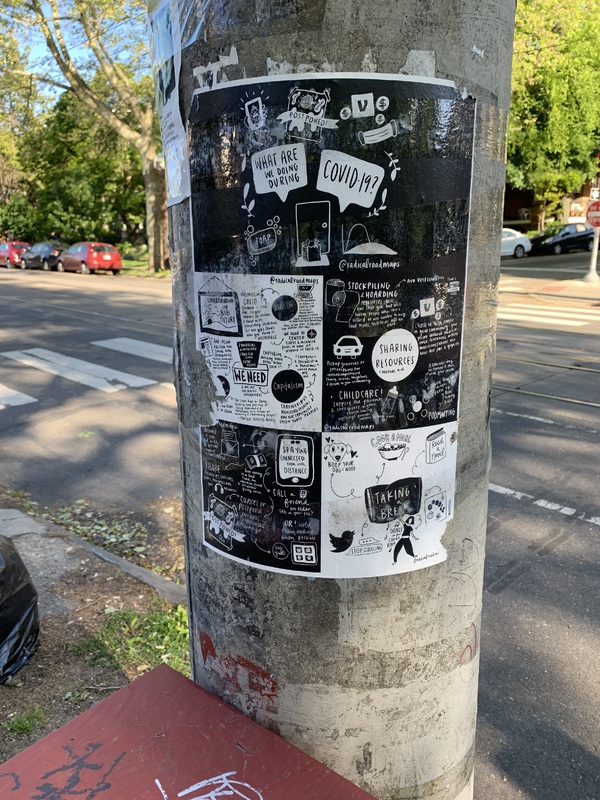 2020-04-20
2020-04-20Experiencing Covid in West Philadelphia
As lock down and social-distancing mandates were initiated in the spring of 2020, I was living in a tiny apartment in West Philadelphia. At the time, I was finishing my dissertation, which is a historical account about the ways in which another pandemic, HIV/AIDS, impacted the lives of children born with the disease, their families, and the healthcare workers that cared for them. Given that my entire life – work and personal – was crammed into a roughly 400 square foot apartment, I began taking long walks through the area of West Philly where I lived. These walks were mostly meant to help my mental health – sometimes they worked, other times they did not – and to relieve my cabin fever. From roughly March through June of 2020, I began taking photos of pandemic-related things that appeared on my walks. Save for my photo of the empty Target pharmacy shelves, the pictures – along with my journal entries and a small collection of pandemic-related ephemera – were an effort to document how the pandemic impacted my small part of the world. I also took them as a way to help me remember this era-defining event. -
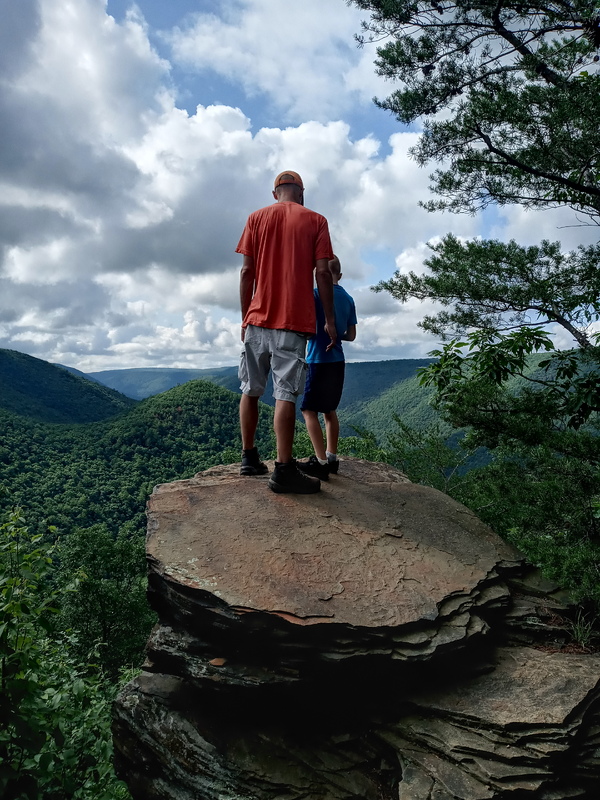 2021-05-15
2021-05-15A Measure of Peace During a Global Pandemic
During the COVID-19 pandemic I was working in health care for an agency. This meant that I traveled from facility to facility where there were staffing shortages and predominantly worked in the covid units. It was a strange experience to travel across Pennsylvania during this time and have little to no traffic that would typically have existed were there not any restrictions enacted. Therefore, when the restrictions were lifted, I did not feel an urge to travel to any great extent as I never stopped working during the lockdowns and if anything, my hours were significantly increased to the point of constant exhaustion. However, when the restrictions were lifted, I found myself in need of outdoor therapy. I am an avid hiker and enjoy the silence that trails offer. I have found that my favorite trail to visit is the Golden Eagle Trail, or as my children refer to it “Rattlesnake Ridge.” While the restrictions were lifting in most places at the time, I hardly noticed because in health care they remained for a much longer period. On many occasions in 2021, my family accompanied me to the Golden Eagle Trail to step away from society and unwind as a family without feeling the pressure of all the changes that were brought about by the pandemic. These trips provided me with lasting memories of my son reaching for my hand for security when walking along a thin train with a steep drop alongside it, my husband helping steady me across slippery rocks, and more. The photos from these trips are everlasting reminders of the happiness that hiking, especially with my family, bring me. Moments like these are to me the important moments in life. -
2023-07-21
A Year of Betrayal
This doesn't need to be long I am just glad to have a way to express how incredibly disappointed I have been throughout the course of this pandemic. In the first few months after the outbreak, most of us relied heavily on the public governmental briefings by Dr Fauci and others, and we eagerly awaited the development of tests and vaccines by the pharmaceutical industry. We trusted that our government and our doctors were working earnestly to provide good solutions to a terrible problem, quickly. But if we fast forward a few years, what a horrible change has transpired! Pretty much everyone who we trusted at the beginning of the pandemic has been proven either a downright liar or to have been working for their own private interests all along. Dr Fauci couldn't get his story straight - repeatedly - over simple matters, and lied again and again about the connection between the virus, the government, and the Wuhan virology lab. Though various remedies (like ivermectin) were decried as malicious and dangerous, we now know that the pharmaceutical companies we were busy trusting were pushing to consider the use of ivermectin medical malpractice, because they wanted an emergency use authorization for their insufficiently tested and experimental vaccines. Some of us already knew we couldn't trust our government, but most of us hoped that we could at least trust our doctors. What a disappointment. -
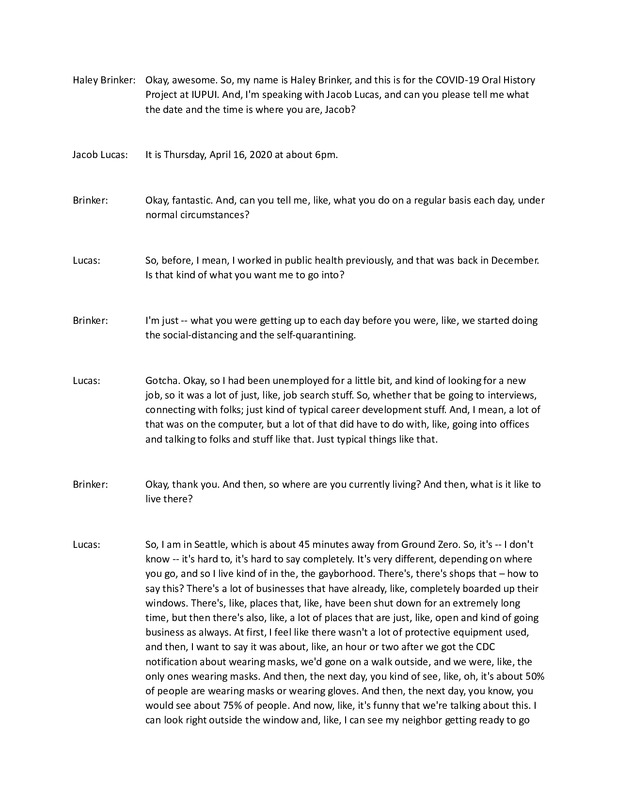 04/16/2020
04/16/2020Jacob Lucas Oral History, 2020/04/16
-
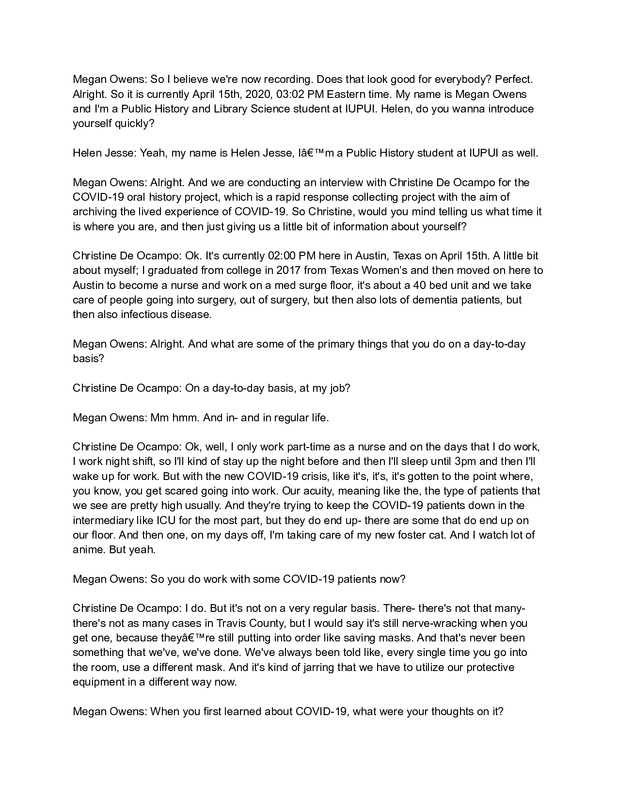 04/15/2020
04/15/2020Christine De Ocampo Oral History, 2020/04/15
-
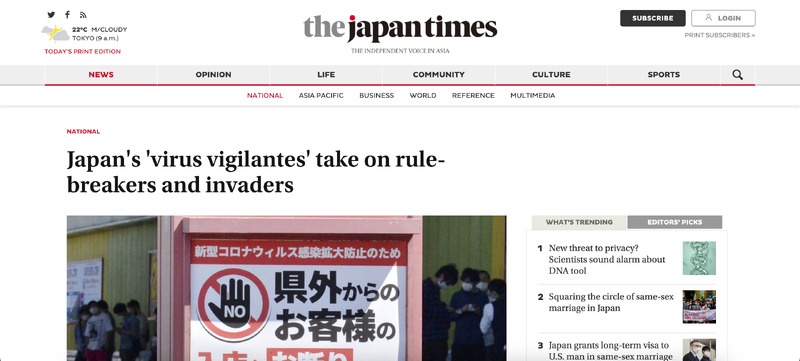 2023-05-16
2023-05-16Vigilantism in Pandemic Japan
It is about the excessive vigilantism that Japan experienced during the COVID-19 pandemic. Some people became the target of harsh criticism for failing to abide by governmental regulations, and I can remember that I felt a sense of experiencing the negative aspect of society seeing such harsh vigilantism against others. It is important to me because I can unconsciously become part of such vigilantism and should be aware of why I should not relentlessly accuse others of their actions. -
 2023-05-16
2023-05-16News Article Analysis: India Is What Happens When Rich People Do Nothing
I will analyze this article focusing on the devastating impacts of the Covid-19 pandemic, including exploitation of marginalized groups like migrant workers, oxygen and other medical resource shortages, and the overall structural consequences of poor governance and health infrastructures in India. Not only does the writer Krishnan cater to the failures of the current Indian federal government during the pandemic, but he aims to point out the great moral failure of our whole generation, which has exposed the long-existing structural issues in providing for public healthcare and social security of Indian citizens. -
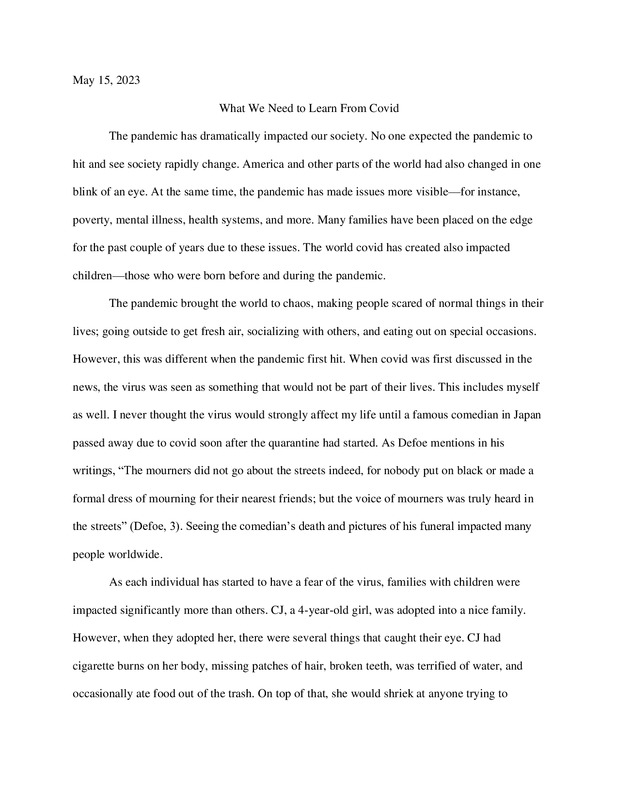 2023-05-15
2023-05-15What we need to learn from Covid
This is based off of what I have seen and heard throughout the pandemic. I have decided to post this because we need more awareness of the issues in education. -
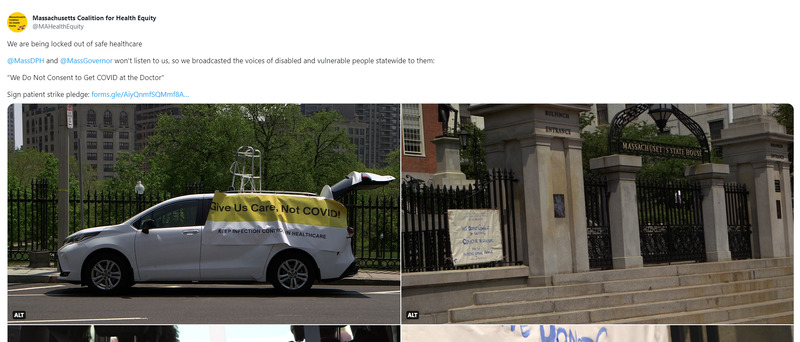 2023-05-14
2023-05-14Pandemics are Not "Great Equalizers" - Comparing COVID-19 to the Bubonic Plague Outbreak of 1870-1905
With the designation of COVID-19 as a "public health emergency" by the Centers for Disease Control and Prevention (CDC) ending as of May 11, 2023, public healthcare facilities throughout the US are rolling back protections they once employed to try to keep people safer during this ongoing pandemic. So, as this unit asks of us students, are pandemics the “great equalizers” in terms of social inequalities, and is there more equality now that the "emergency" has been deemed to be over? I argue that this is not the case, as immune compromised and disabled people have been more or less left for dead. A huge swath of healthcare facilities have removed mask mandates for care providers and hospital visitors, which leaves vulnerable and immune compromised people at a much higher risk of getting COVID-19 while receiving the medical care that is necessary for them to manage their conditions. In response, people and organizations, such as the Massachusetts Coalition for Health Equity in the tweet above, have begun to mobilize in favor of maintaining COVID-19 protections in healthcare settings by organizing strikes, protests, petitions, and phone banks to public officials. The reasons for maintaining COVID precuations such as mask mandates, access to COVID tests, and enhanced filtration in healthcare settings are clear. As the Massachusetts Coalition for Health Equity describes in their petition titled "Patient Strike Authorization Vote," the CDC "advises immunocompromised people to avoid crowded indoor settings, which now includes all healthcare institutions without universal masking," essentially maintaining that COVID is dangerous to immune compromised people while giving them no option but to risk exposure if they want to receive their necessary healthcare (Patient Strike Authorization Vote). The petition text explains that "[n]ational leaders in hospital epidemiology argue that universal masking should become the new standard of care, as gloves became with HIV" in order to keep people with compromised immune systems such as young children and elders safe (Patient Strike Authorization Vote). Currently, disabled and immune compromised people "are being locked out of safe healthcare" and are facing discrimination that makes them unwelcome and unsafe in healthcare settings (Massachusetts Coalition for Health Equity). In order to relate this modern COVID-19 pandemic to our course materials and demonstrate that discriminatory treatment during times of disease is not new, I will compare the above post to points from the text "The Chinese as Medical Scapegoats In San Francisco, 1870-1905" by Joan B. Trauner. This text discusses the discrimination against Chinese and other East Asian people living in San Francisco's Chinatown during a bubonic plague outbreak in the late nineteenth century. Sinophobic and anti-Asian sentiments, similar to those that arose during the epidemic Trauner details, have also been evident throughout the COVID-19 pandemic, so much so that even US President Donald Trump referred to COVID-19 as the "China virus." Ableism has also been prevalent throughout the COVID pandemic, as many people no longer care about the effects of the virus, because it harms disabled and immune compromised people most, especially people who also face racial discrimination in healthcare. Trauner explains that, because white people in the US believed the plague primarily affected Chinese and other Asian people, and because plagues were bad for business,"[t]he governor of California, Henry T. Gage, and executives of big business and of the large railroads, in conjunction with the San Francisco Board of Trade, the San Francisco Chamber of Commerce, and the Merchants Association, were all determined to prove that the plague did not exist in San Francisco" (78). The author of the Patient Strike Authorization Vote argues that today, we see a similar pro-business sentiment that comes at the expense of immune compromised people who are more likely to get sick with and die from COVID-19, writing: "Hospitals that remove masks and surveillance testing are making a value judgement about our lives, because they want to preserve their profit margins" (Patient Strike Authorization Vote). The CDC's ending of the COVID-19 public health emergency designation and the resulting halt of COVID mitigation procedures indicate that people are ignoring the needs of immune compromised people so that everyone can feel more comfortable going "back to normal" and maintaining consumption habits that are desired by businesses. Additionally, in both the past plague outbreak and the current pandemic, public health officials have shown hesitancy to give people vital information, which has led to harm. As Trauner explains, during the bubonic plague epidemic, "San Francisco Mayor Eugene Schmitz refused to approve the printing of health reports and vital statistics and even attempted to remove from office four members of the Board of Health who persisted in stating that plague existed in San Francisco" (79). Today, because the public health emergency designation ended on May 11th, 2023, the CDC is "no longer reporting aggregate cases and deaths, COVID-19 Community Levels, COVID-19 Community Transmission Levels, or COVID-19 Electronic Laboratory Reporting (CELR) data," all of which have been used to determine the severity of the situation throughout the pandemic (COVID Data Tracker). Meanwhile, over one thousand people are dying of COVID every single week, but COVID transmission levels are not being tracked, so people cannot know how many COVID positive cases there are in their county and how likely they are to contract the virus by going out in public (COVID Data Tracker). Another similarity between the COVID-19 pandemic and the bubonic plague outbreak of the late nineteenth century lies in the responses of the people facing discriminatory treatment in public health settings during these respective disease outbreaks. Trauner writes that before, during, and after the bubonic plague outbreak, Chinese businesses and health practitioners constructed and operated their own hospitals that would treat the people of Chinatown, because they were not welcome at other hospitals due to racial discrimination (81). Trauner explains that "[e]arly Chinese immigrants realized the necessity of banding together and providing for their own health care needs," in light of the government abandoning their health needs (81). Activists and organizations like the Massachusetts Coalition for Health Equity are currently banding together and fighting to get better and safer care for immune compromised people during the COVID-19 outbreak, as they are also facing discrimination at hospitals rolling back COVID precautions, because these spaces are not safe for them. The organizing they are doing to try to make healthcare settings safer for immune compromised people looks different, as no one is proposing the creation of immunocompromised-specific hospitals. They are fighting for better treatment, still, using slogans like "We Do Not Consent to Get COVID at the Doctor," and urging people that "[w]e must take collective action to prevent this mass violation of our human rights and federal rights to safe care," as stipulated under the Americans with Disabilities Act (Massachusetts Coalition for Health Equity). In both disease outbreaks, it has been the duty of those being discriminated against to take care of and advocate for themselves. So, in fact, pandemics are not "great equalizers"; in reality, they not only make pre-existing inequities even more visible, but exacerbate them even further. As Trauner argues, "Health policy [...] manifests not only the state of the medical sciences, but the expectations and the value system of society-at-large," and as such, if society-at-large is racist and ableist, then the health policies put into place will reflect these discriminatory values (70). These governmental measures come at a cost to everyone, and especially those facing racist and ableist discrimination. Had the nineteenth-century bubonic plague outbreak been determined an emergency and treated as a serious threat in spite of sinophobic and anti-Asian sentiments, perhaps more research could have been carried out sooner, and more lives could have been saved. If people in the US continue to take the COVID-19 pandemic seriously and not dismiss the pleas of immune compromised and disabled people to continue precautions, perhaps loss of life and further disablement from COVID infection can be mitigated. -
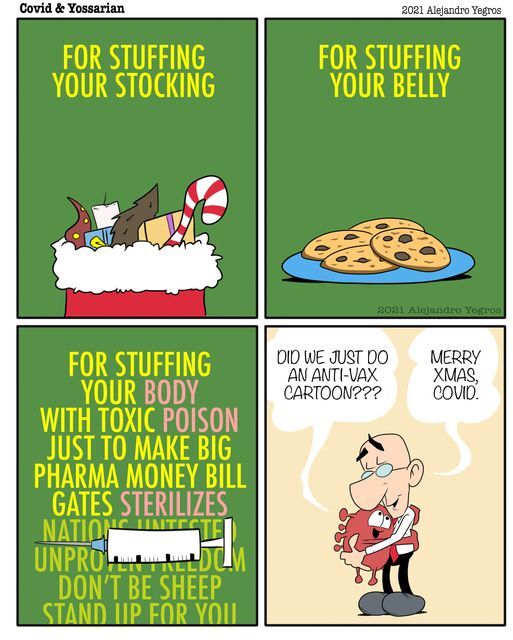 2021-12-24
2021-12-24Xmas Present
A comic strip about Covid-19 -
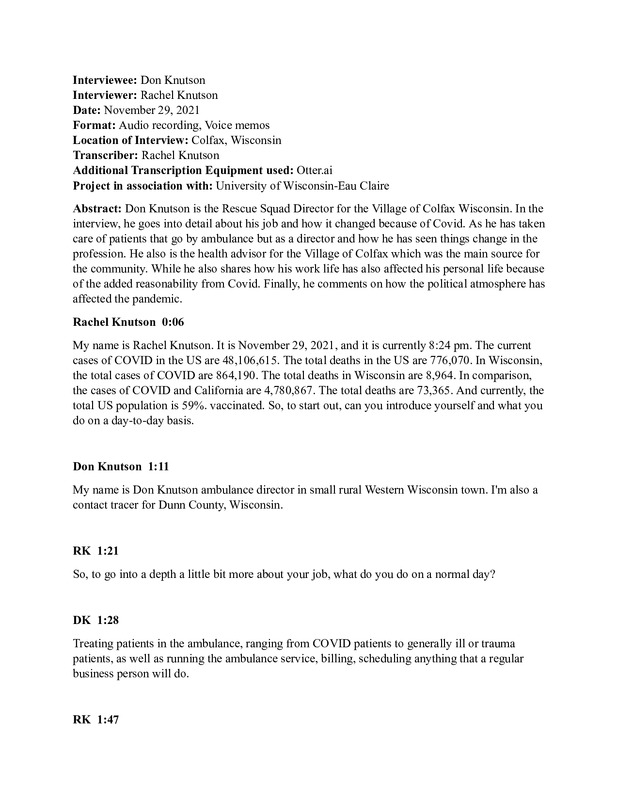 11/29/2021
11/29/2021Don Knutson Oral HIstory, 11/29/2021
Don Knutson is the Rescue Squad Director for the Village of Colfax Wisconsin. In the interview, he goes into detail about his job and how it changed because of Covid. As he has taken care of patients that go by ambulance but as a director and how he has seen things change in the profession. He also is the health advisor for the Village of Colfax which was the main source for the community. While he also shares how his work life has also affected his personal life because of the added reasonability from Covid. Finally, he comments on how the political atmosphere has affected the pandemic. -
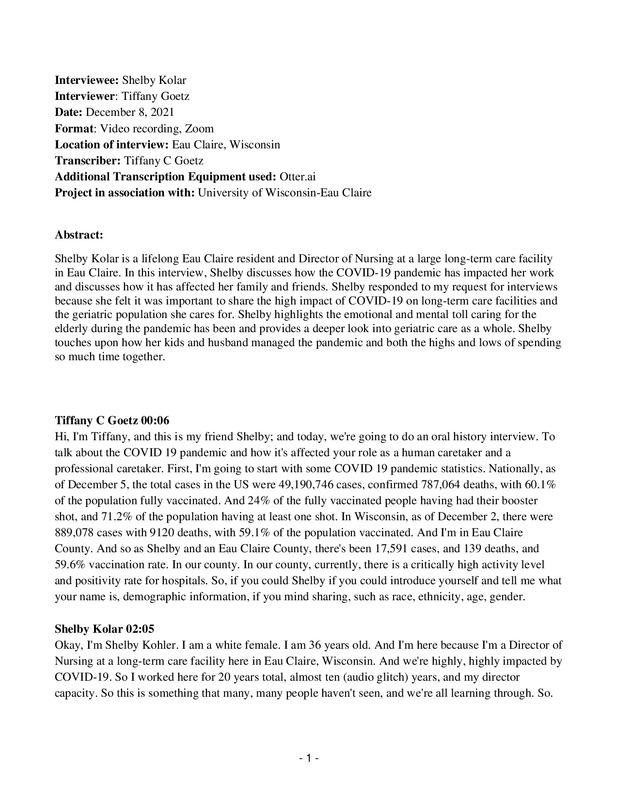 12/08/2021
12/08/2021Shelby Kolar Oral History, 2021/12/08
Shelby Kolar is a lifelong Eau Claire resident and Director of Nursing at a large long-term care facility in Eau Claire. In this interview, Shelby discusses how the COVID-19 pandemic has impacted her work and discusses how it has affected her family and friends. Shelby responded to my interview request because she felt it was important to share the high impact of COVID-19 on long-term care facilities and the geriatric population she cares for. Shelby highlights the emotional and mental toll of caring for the elderly during the pandemic and provides a deeper look into senior care as a whole. Shelby touches upon how her kids and husband managed the pandemic and the highs and lows of spending so much time together. -
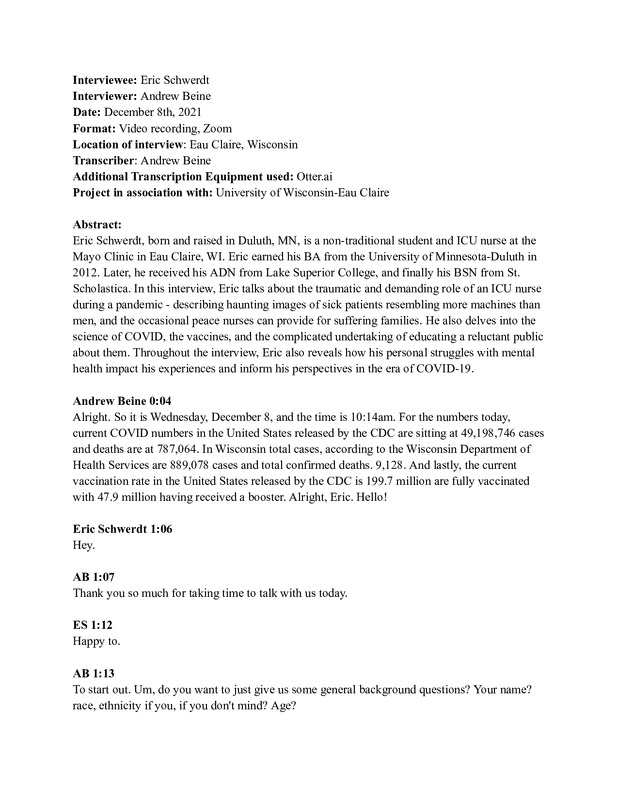 12/08/2021
12/08/2021Eric Schwerdt Oral History, 2021/12/08
Eric Schwerdt, born and raised in Duluth, MN, is a non-traditional student and ICU nurse at the Mayo Clinic in Eau Claire, WI. Eric earned his BA from the University of Minnesota-Duluth in 2012. Later, he received his ADN from Lake Superior College, and finally his BSN from St. Scholastica. In this interview, Eric talks about the traumatic and demanding role of an ICU nurse during a pandemic - describing haunting images of sick patients resembling more machines than men, and the occasional peace nurses can provide for suffering families. He also delves into the science of COVID, the vaccines, and the complicated undertaking of educating a reluctant public about them. Throughout the interview, Eric also reveals how his personal struggles with mental health impact his experiences and inform his perspectives in the era of COVID-19. -
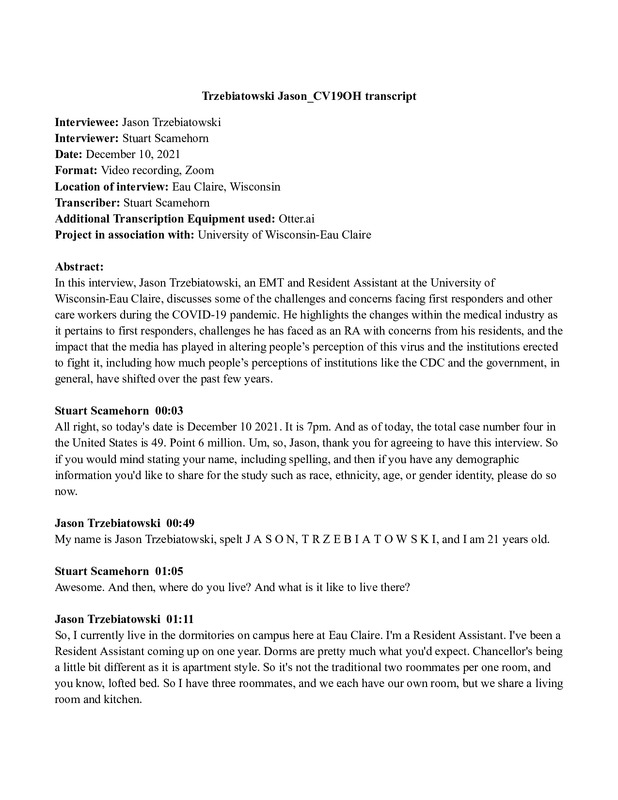 12/10/2021
12/10/2021Jason Trzebiatowski Oral History, 2021/12/10
In this interview, Jason Trzebiatowski, an EMT and Resident Assistant at the University of Wisconsin-Eau Claire, discusses some of the challenges and concerns facing first responders and other care workers during the COVID-19 pandemic. He highlights the changes within the medical industry as it pertains to first responders, challenges he has faced as an RA with concerns from his residents, and the impact that the media has played in altering people’s perception of this virus and the institutions erected to fight it, including how much people’s perceptions of institutions like the CDC and the government, in general, have shifted over the past few years. -
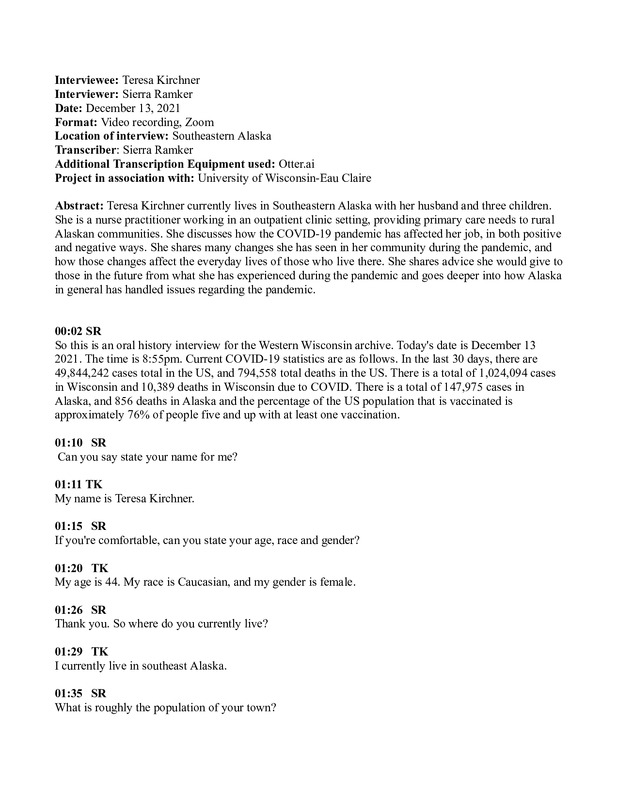 12/13/2021
12/13/2021Teresa Kirchner Oral History, 2021/12/13
Teresa Kirchner currently lives in Southeastern Alaska with her husband and three children. She is a nurse practitioner working in an outpatient clinic setting, providing primary care needs to rural Alaskan communities. She discusses how the COVID-19 pandemic has affected her job, in both positive and negative ways. She shares many changes she has seen in her community during the pandemic, and how those changes affect the everyday lives of those who live there. She shares advice she would give to those in the future from what she has experienced during the pandemic and goes deeper into how Alaska in general has handled issues regarding the pandemic. -
 11/27/2021
11/27/2021Rebecca Ferber Oral HIstory, 2021/11/27
Rebecca Lynn Ferber is a resident of Oronoco, MN, and currently works for the Mayo Clinic in Rochester as a CRNA (Certified Registered Nurse Anesthetist). In this interview, Rebecca talks about how COVID has affected her job as a CRNA and Mayo Clinic as a whole as well as a mom and wife. She also talks about how it has affected her family and friends and how some of her relationships have been strained because of different views on COVID. She touches on how it not only affects people's physical health but mental health as well and gives some advice for future generations. -
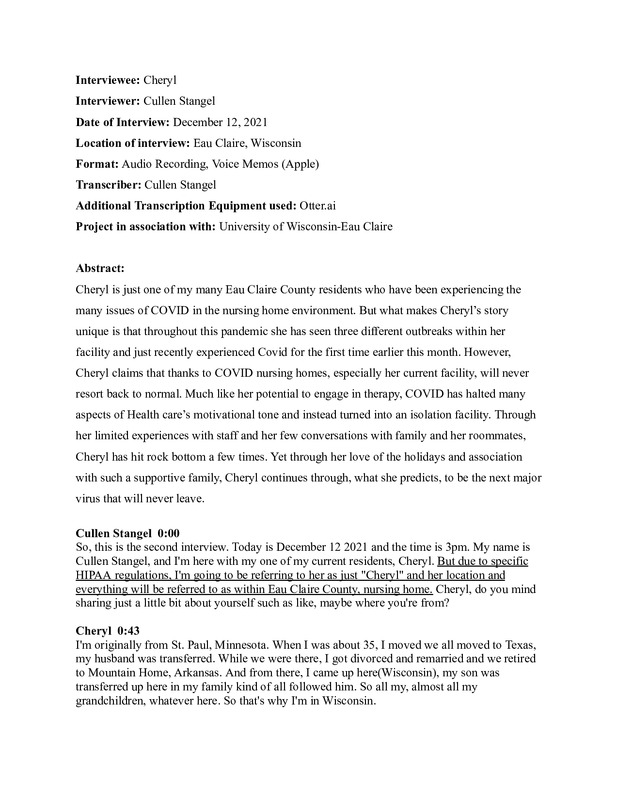 12/12/2021
12/12/2021Cheryl Oral History, 2021/12/12
Cheryl is just one of my many Eau Claire County residents who have been experiencing the many issues of COVID in the nursing home environment. But what makes Cheryl’s story unique is that throughout this pandemic she has seen three different outbreaks within her facility and just recently experienced Covid for the first time earlier this month. However, Cheryl claims that thanks to COVID nursing homes, especially her current facility, will never resort back to normal. Much like her potential to engage in therapy, COVID has halted many aspects of Health care’s motivational tone and instead turned into an isolation facility. Through her limited experiences with staff and her few conversations with family and her roommates, Cheryl has hit rock bottom a few times. Yet through her love of the holidays and association with such a supportive family, Cheryl continues through, what she predicts, to be the next major virus that will never leave. -
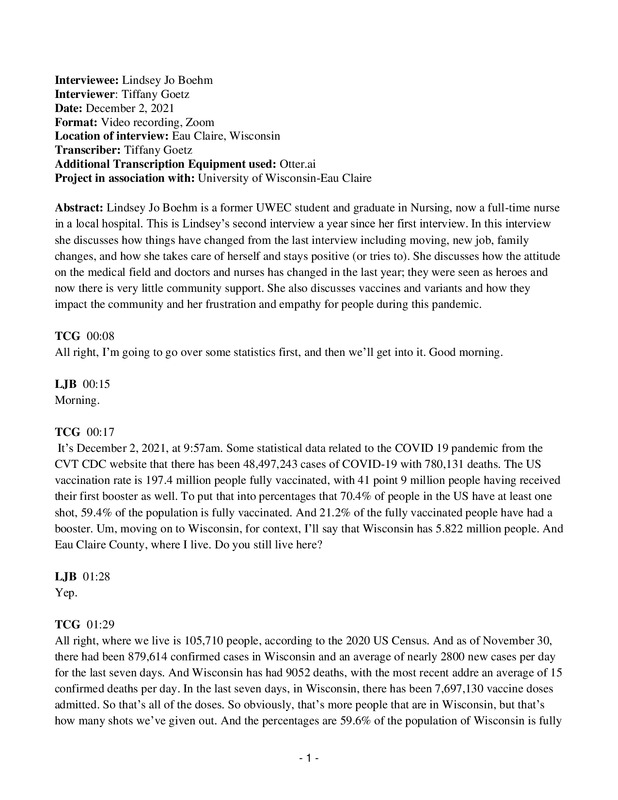 12/02/2021
12/02/2021Lindsey Jo Boehm Oral History, 2021/12/02
Lindsey Jo Boehm is a former UWEC student and graduate in Nursing, now a full-time nurse in a local hospital. This is Lindsey’s second interview a year since her first interview. In this interview, she discusses how things have changed from the last interview including moving, a new job, family changes, and how she takes care of herself and stays positive (or tries to). She discusses how the attitude in the medical field and doctors and nurses has changed in the last year; they were seen as heroes and now there is very little community support. She also discusses vaccines and variants and how they impact the community and her frustration and empathy for people during this pandemic. -
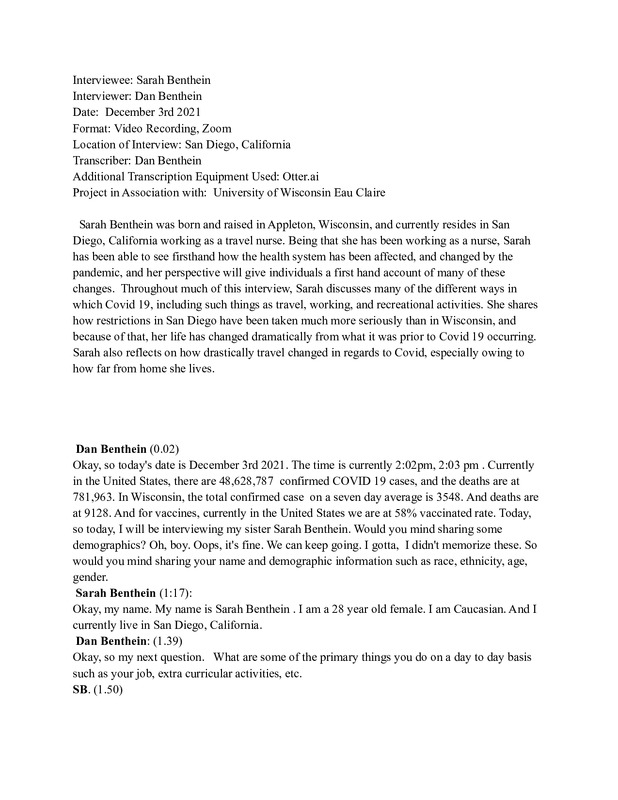 12/03/2021
12/03/2021Sarah Benthein Oral History, 2021/12/03
Sarah Benthein was born and raised in Appleton, Wisconsin, and currently resides in San Diego, California working as a travel nurse. Being that she has been working as a nurse, Sarah has been able to see firsthand how the health system has been affected, and changed by the pandemic, and her perspective will give individuals a first-hand account of many of these changes. Throughout much of this interview, Sarah discusses many of the different ways in which Covid 19, including such things as travel, working, and recreational activities. She shares how restrictions in San Diego have been taken much more seriously than in Wisconsin, and because of that, her life has changed dramatically from what it was prior to Covid 19 occurring. Sarah also reflects on how drastically travel changed in regards to Covid, especially owing to how far from home she lives. -
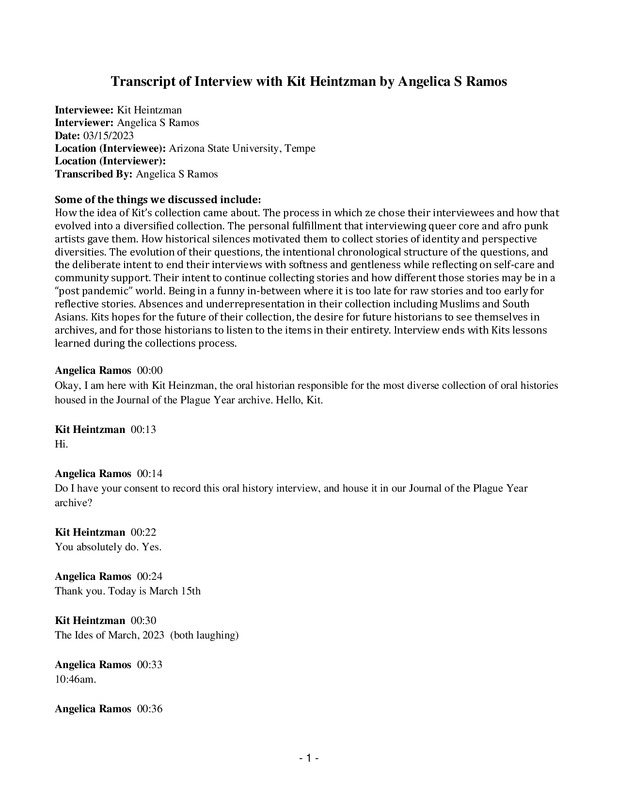 2023-03-15
2023-03-15Kit Heintzman Oral History, 2023/03/15
Kit Heintzman is a recovering academic currently residing in Lenapehoking, who was trained in the medical humanities with a special interest in queer theory, animals, and the history of nationalism. Kit has developed a singular collection of oral histories of the pandemic for A Journal of the Plague Year, collected from a range of individuals with widely diverse experiences. That collection addresses significant silences surrounding the pandemic broadly and within JOTPY more narrowly. In this item Kit is interviewed by Angelica and Erin, both with Arizona State University, about Kits collection process. -
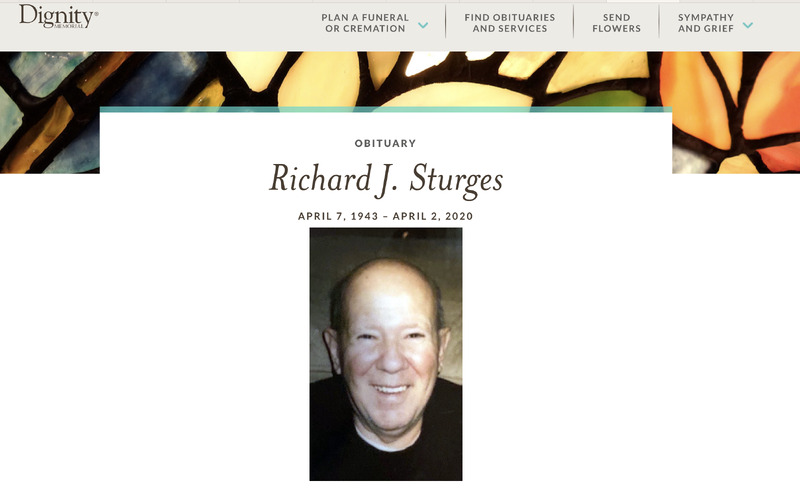 April 19, 2020
April 19, 2020In Memory of Richard Sturges
My dad passed away a week ago today after contracting COVID-19 in a SI nursing home and transferring to SIUH. When we first learned of my dad’s diagnosis in the nursing home, his doctor prescribed him hydroxychloroquin which he had been using with good results on other patients. However upon trying to fill the prescription learned that the NY Health Dept under order by the Governor, had restricted the use of this drug to hospital patients only. You can imagine our dismay to learn this and our family immediately jumped into action contacting every state legislator about this horrific restriction on the elderly and nursing homes. The two who stepped forward to answer our calls and hear our concerns were Borough President Oddo and State Senator Lanza and they made many calls on our behalf. Before long the restriction on nursing homes was lifted, hopefully before too many lives were lost, but the ban remains on any other New Yorker who tests positive and is not hospitalized. My brother and sister, along with their spouses, have now tested positive. Two of them are first responders and had a lot of difficulty getting tested. I have been staying with and caring for my mom through this time and fortunately we have managed to avoid contracting this virus, so far. My dad was buried 2 days after he died. The Navy showed up to play taps and present my mother with a flag “on behalf of the President and a grateful nation”, my dad would have liked that. The picture is attached and I think says a thousand words. Only my siblings and mother were allowed to attend the burial, a funeral is not allowed at this time. We all wore masks and stood apart from each other and afterwards drove home to our separate houses…truly heartbreaking. The fact that my dad was isolated for weeks before his passing is the hardest thing for my mom to bear. They are lifelong Staten Islanders and this is their story…. Thank you. -
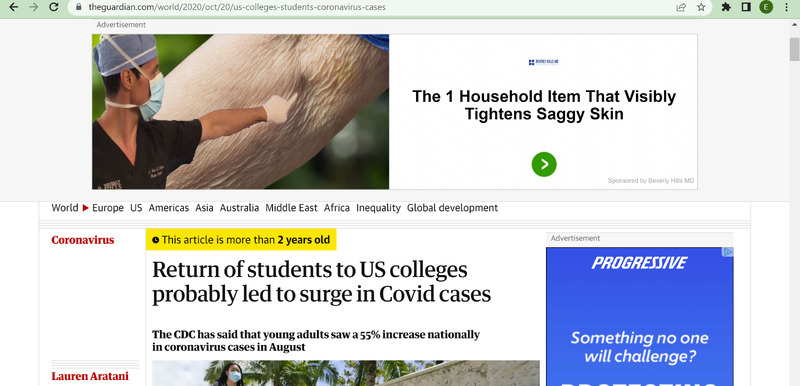 2020-10-20
2020-10-20How covid affected NYC?
Covid has affected everyone by the way you live your everyday life. Covid has affected New york city in many different ways , For example covid affected business to close down months including schools . Schools having to go remote . Another way New york city has been affected by the transit , The transit systems like the trains ,buses and commuter rail and ferries as a result to this the transportation has plummeted . For the subways in New York City it went down 90 percent and the buses went down 75 percent. The reason for this happening is people in quarantine and not going to work since some are working from home . Covid has affected health care workers. For example health care workers like doctors and nurses are around people who have it so they are more prone to get it. .This pandemic caused a lot of changes in the world. It caused everyone to be less social and not go out as much as it caused us to wear masks everywhere. It also caused a lot of people mental and emotional health to go down. For example there’s been a lot of social isolation which caused families to not be able to see each other as often. COVID-19 has impacted social mobility on child care cost and for families school dropout rate has increased due to fear of getting Covid. COVID-19 especially affected families due to not having jobs or working from home or being put on unemployment there’s been a big impact of Covid on families and family relationships creating a lot of tension and feeling depressed or not being united together. These pandemic parts of the population in different situations continue to affect people living in poverty situations with older people and disabilities. A lot of people have been put on unemployment and not being able to pay the rent. Covid has caused a lot of deaths and people could not be able to bury their loved ones. During The beginning of the year when the Pandemic was occurring depending on the situation of others some people were probably affected mentally Health care was provided to those who really needed it due to people not being able to pay for it and The state of new york lost money as well , It affected relationships and people got help by going therapy and staying connected to people . This pandemic affected many people personally. Covid has affected everyone's plan including travel because there's been travel bans and going to the airport has a lot of restrictions. A Lot of businesses are closing down to this pandemic by not giving income . Due to health care a lot of pregnant women had very high dress levels that affected their pregnancy . Which caused health care workers to be very aware of what was going on . Their risking their own lives to help us and young teens and kids were not able to fully able to enjoy the success of completing in graduating either high school such as prom or etc.it affected everyone's life and still is . This has caused a lot of stress and tension but has allowed people to be stronger in a sense and to appreciate the little things in life . Covid 19 has caused many hardships including loss of jobs . Some questions that still remain on this subject would be , When are things going back to normal ?, When is the vaccine coming out to prevent this ? When will this end ?. A message of hope i would say is everything will get better with time. The productivity has been slow due to employment going down ,People losing jobs . my personal experience with covid has become a learning experience . For example this pandemic has showed me to not take things for granted . -
2021-09-24
How COVID-19 affected me and my family
September 24th 2021. It was just another normal day in the new pandemic experience, most of my day was spent on Zoom doing online classes for about four hours of the day. Today was different because I had an orthodontist appointment to finally have my braces removed after about 2.5 years of them on. As almost everyone else, I was finally excited to have my braces taken off and actually see my new smile. So after my 2 classes my mom drove me to the orthodontist and left me in the office to go run other errands. After leaving to do so, I had gotten my braces remove in what was really fast time compared to what I had envisioned. So when I had finished up and scheduled a future appointment for my retainer fitting I called my mom to see when she was going to pick me up and no response. I left a message and then called my dad. Again no response. I texted him and he said, “(Name) come home by bus. Mom had to go” I didn’t think much of it so I took the bus home. After I got home I called out in the house and had no response so I walked in normally, taking off my shoes and sweater. I walked into my parents bedroom and seen my parents on the bed. My mom almost curled up teary eyed and tissues next to her. My dad sitting on the edge of the bed next to her holding the tissue box. Obviously with the circumstances of that time, my heart sunk thinking someone died. COVID-19 is known to be fairly hard on the geriatric population so when my grandma from my mothers side had gotten it the night before, we were all on edge. My mom didn’t say a word, so my dad took me outside the room and said something. I still to this day can’t recall what he was saying and I just walked away. To this day I’ve been afraid to ask of the specifics, all I know was that she was alone in the hospital because of the country she was in had strict hospital visitation policies. I still don’t know how to deal with these emotions because honestly she was the person I loved the most second to my mother. She helped raise me and made me into the man I am today. Thank You وداد -
2020-03-06
The Two Week Break
My Junior year at Midwood High School took an expected turn as a national emergency was declared on March 13, 2020. I remember watching the news with my mother, excited to see I would have two weeks off from school. My mother and I would both be home as all non-essential businesses moved to remote or closed down indefinitely. I immediately messaged my friends about the two week break, planning to play video games all day long. We spent those two weeks staying up late as if it was an extended spring break. Little did I know that those two weeks would turn into months of isolation, living in fear of going into the outside world. I feared for my father as he was a registered nurse at Woodhull Hospital. Not only did he have to go outside everyday for work, but he would be face to face with patients, many sick and dying from this new virus that took the world by surprise. There was no vaccine for almost an entire year, so all he could rely on were masks, gloves, face shields and hair nets. My father and many other medical workers were needed overtime to deal with the immense amount of patients coming in everyday. As he came home from work my mother would bring his clothes and leave them by our front door. I worried for him at work as I feared he could get this virus that we were still learning about. Thankfully he never got sick with Covid-19 during the early pandemic, and with the new vaccines in development many of our fears were put to rest. After almost two months of not having any classes we were introduced to remote learning through zoom and google classroom. It was a very new experience for my fellow classmates and I, but it was nice not having to leave your bed to go to class for a while. However that relief of not waking up early to go to class turned into yearning to go to school and seeing my friends. Waking up every morning to see a screen filled with blank profile pictures with names made me feel very lonesome. I would never imagine missing going to school, but it was something that I had taken for granted. In my senior year of high school there was the option for hybrid learning which I was very excited about, but I'd later find out that there would only be rows of desks set up in my school gyms we used for physical education. It wouldn't be the everyday schedule of switching classes and seeing my friends in the hallways and library. I ended up doing another year of remote learning which was very draining but I managed to do well in all my classes with nothing else to do. Unfortunately I did not have a prom or senior trip, but I was very lucky to have an in person graduation and see all of the people I once saw everyday again. This story of the pandemic is very significant to me as it taught me to never take things for granted as everything can change in a moments notice. The things I'd known as my everyday routine of school and hanging out became a distant memory for a long time until numbers and fears of the virus fell. Being able to go to campus now and have a regular life again is something I will now cherish forever. It is still somewhat hard to socialize again after being isolated for so long, but I have made some friends along the way and I look forward to all the memories that await me in the future. -
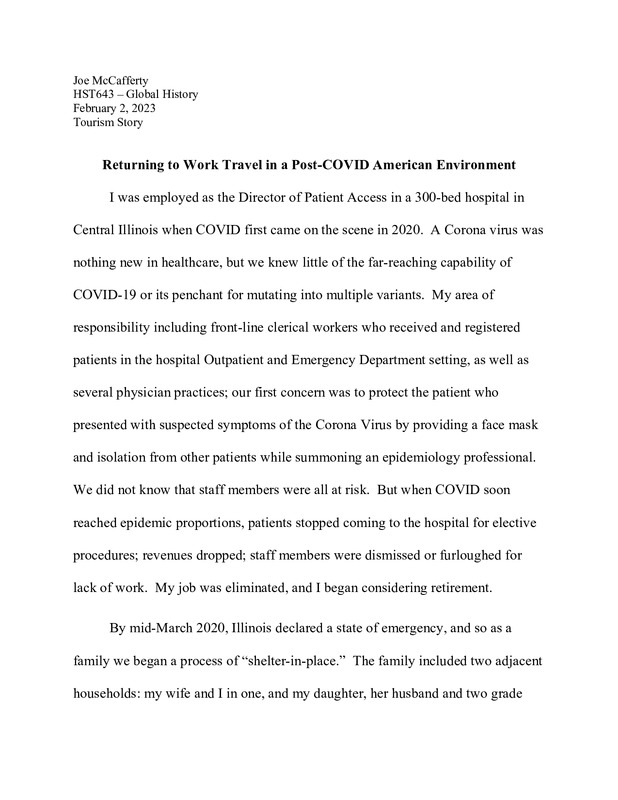 2020-02-23
2020-02-23Return to Travel After Covid
Enduring COVID restrictions impacting travel. -
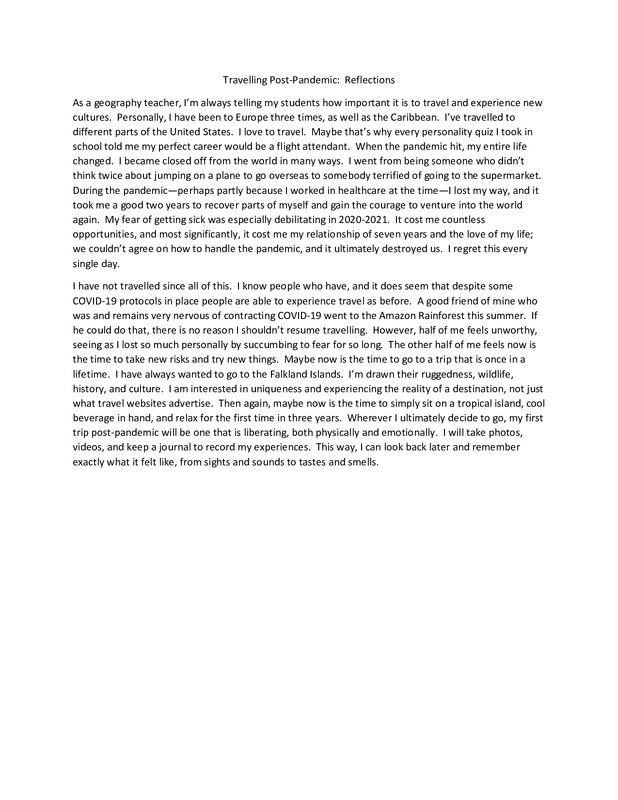 2023-01-29
2023-01-29Travelling Post-Pandemic: Reflections
Deciding whether or not to travel post-pandemic has been weighing on me emotionally. Here, I identify reasons I should vs should not travel, as well as where I would go and why. -
2023-01-22
COVID Restrictions and Visiting Mom.
My mother has special needs and since 2014, lived in a townhome with three roommates, facilitated by Penn Foundation, a behavioral healthcare provider. I lived only 10 minutes away, and once a week I would visit her on my days off. I would bring fast food or pizza and we would watch movies together in her room. When the pandemic began, Penn Foundation - like most other healthcare facilities - imposed tight restrictions for the safety of those under their care. As a result, I was unable to visit my mother for half a year, and after restrictions were loosened, our visits were relegated to sitting on her front porch eating and talking. Due to a deterioration in her condition, she was moved to a nursing facility. We never got to have another movie day. The pandemic had changed the way I visit my mother forever. -
 2021-12-28
2021-12-28Pharmacy Technician Shortages
This NBC article goes into detail about the shortage of pharmacy technicians as a result of COVID-19. Drug shortages, staffing shortages, increased demand, and additional responsibilities with little to no training or compensation led to burnout. -
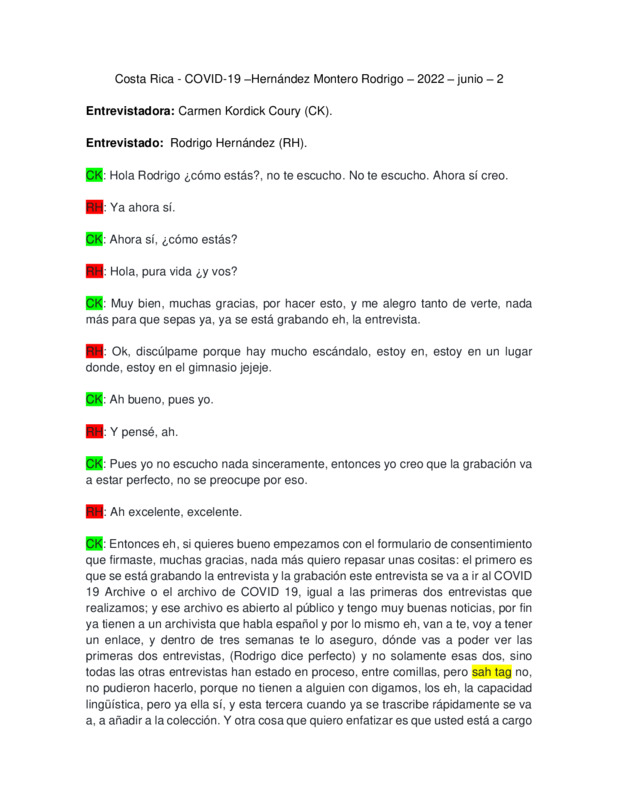 06/02/2022
06/02/2022Rodrigo Hernández Montero Oral History, 2022/06/02
En esta entrevista Rodrigo Hernández Montero es entrevistado por Carmen Kordick Coury concerniente al covid-19 en Costa Rica. Empiezan con que había cambiado desde el ano anterior. Hablan del gobierno, de la vacuna y su experiencia cuando el se vacuno. Habla de sus compañeros que aún no se habían vacunado y de como le fue a su familia cuando se enfermaron del covid. Rodrigo también habla de la caja, describe su trabajo de odontólogo, habla de sus pacientes y del uso de equipo de protección. Habla de sus compañeros del trabajo y su vida social. De la economía, la inflación y la pobreza, De allí, Rodrigo habla de su hogar y familia, del uso de la mascarilla y de las fuentes de información. Para terminar, habla de las elecciones y del futuro. -
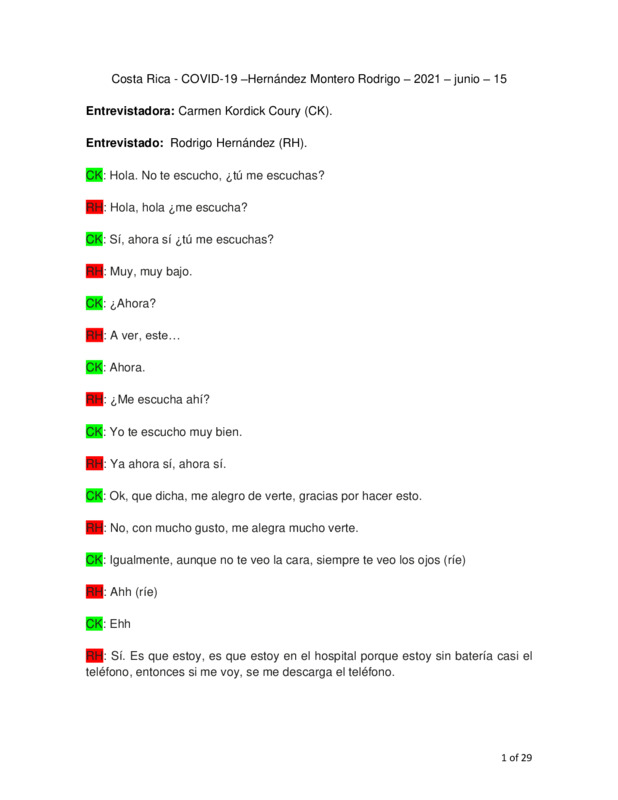 06/15/2021
06/15/2021Rodrigo Hernández Montero Oral History, 2021/06/15
En esta entrevista Rodrigo Hernández Montero es entrevistado por Carmen Kordick Coury concerniente al covid-19 en Costa Rica. Empiezan hablando de cosas que habían cambiado desde el ano interior. Hablan de los cambios que ha visto en el hospital donde trabaja y del equipo de protección. De allí, hablan de la economía, de la vacua, de su hogar y el uso de las mascarillas. Rodrigo cuenta del momento que el vio la situación de la pandemia empeorar, como ha cambiado la cultura de tocar y de su familia. Para terminar, habla de las fuentes de información y del futuro. -
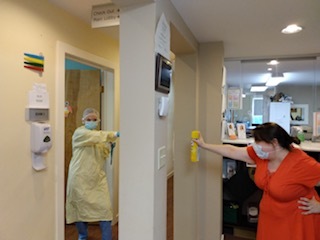 2020-06-21
2020-06-21Disinfectant Battle at the Doctor's Office
The photo was taken at the beginning of the pandemic, probably a Friday in the summer because I was not wearing scrubs (casual Fridays). I was working in a pediatric office as a medical assistant in Litchfield County, Connecticut. If you know anything about that area, it was scary at the time because all of the families with any means in NYC were fleeing the city and coming to Litchfield and Fairfield Counties. We were quite nervous at the time that they would spread covid to our communities at the same rate as it was in NYC. Luckily it did not happen. It was a scary time, as every day we would get the ding in the morning and the end of the day of an email notification telling us how many deaths were in local hospitals, how many beds were left (spoiler- none), how much PPE was available (again, none) etc. We were so short on PPE we had to reuse our masks for a whole week (unless exposed of course). I can still remember the feeling of the little fabric “firs” that would start to itch my face after a few days, and the nice smelling essential oils we put in them to make wearing them tolerable- I used citrus smells, and my coworker used coconut. The worst was the lack of cleaning and disinfecting products. We tried to not see patients that were even remotely sick with covid symptoms because we did not have enough cleaner to disinfect the rooms after they left. When we were fortunate enough to get a new bottle of Lysol, we would take fun photos like this one of me threatening my coworker whom I suspected was covered in germs. Little moments like this helped to alleviate the stress of the moments when that email ding came in at the end of the day. -
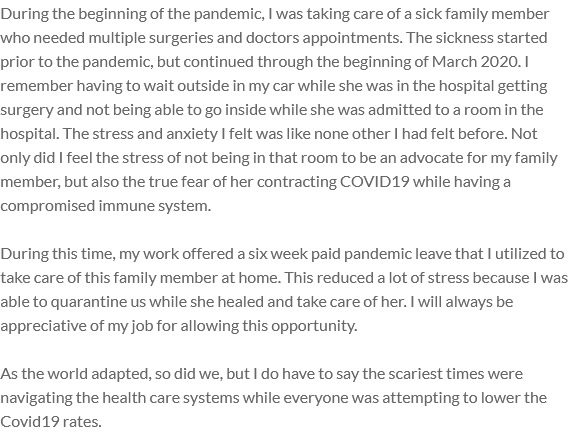 2020-03
2020-03Navigating through medical care during the beginning of the Pandemic
During the beginning of the pandemic, I was taking care of a sick family member who needed multiple surgeries and doctors appointments. The sickness started prior to the pandemic, but continued through the beginning of March 2020. I remember having to wait outside in my car while she was in the hospital getting surgery and not being able to go inside while she was admitted to a room in the hospital. The stress and anxiety I felt was like none other I had felt before. Not only did I feel the stress of not being in that room to be an advocate for my family member, but also the true fear of her contracting COVID19 while having a compromised immune system. During this time, my work offered a six week paid pandemic leave that I utilized to take care of this family member at home. This reduced a lot of stress because I was able to quarantine us while she healed and take care of her. I will always be appreciative of my job for allowing this opportunity. As the world adapted, so did we, but I do have to say the scariest times were navigating the health care systems while everyone was attempting to lower the Covid19 rates. -
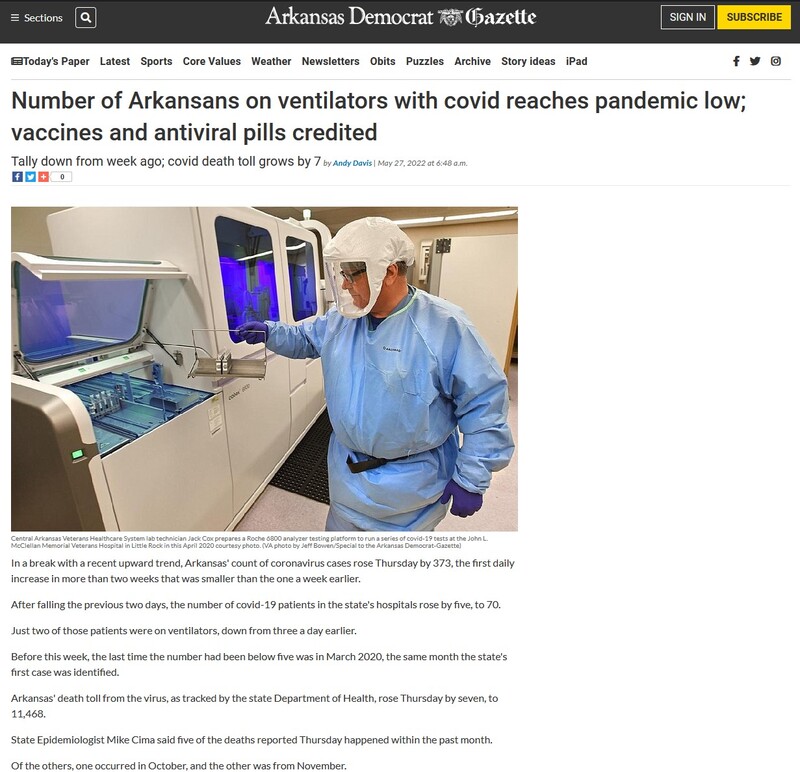 2022-05-27
2022-05-27Moving away from the pandemic in Arkansas
This article details a sharp decline in the number of Arkansans on ventilators due to COVID-19. It further provides information on a new oral drug to combat the pandemic in Arkansas. While cases in Arkansas regularly fluctuate, it is encouraging to see individuals off ventilators which removes some of the strain most Arkansas hospitals have been experiencing over the last two years. A rise in vaccinations and a greater understanding of the disease allows for a return to normalcy that many states are now experiencing. Additionally, and oral drug to combat COVID-19 is helpful and will allow the disease to be easily managed. -
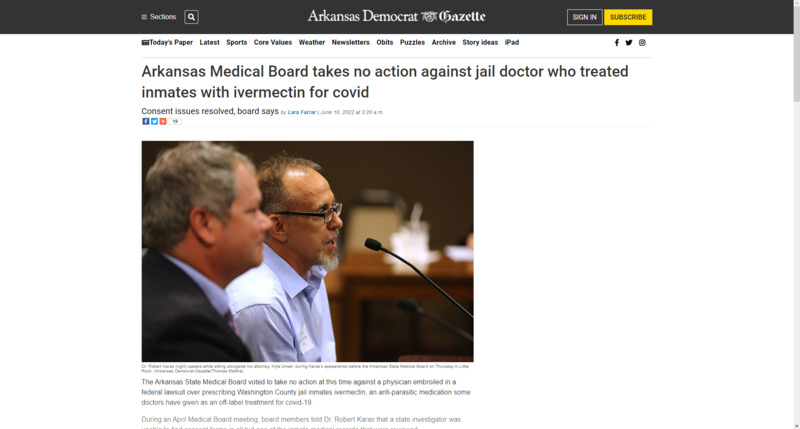 2022-06-10
2022-06-10Arkansas prison doctors and ivermectin
This is a story detailing Arkansas' Medical Board dismissing charges against a Washington County prison doctor for treating prisoners with ivermectin. Arkansas' Medical Board has not explicitly denounced the drug as a treatment for COVID-19, and many physicians prescribe the drug. This particular physician treated several unknowing prisoners with ivermectin in order to combat rising covid cases in the Washington County Jail in April. This dismissal of charges by the Medical Board reveals a deeper skepticism of the pandemic in Arkansas and a willingness of the board to allow physicians to treat their patients as they ultimately see fit with minimal regulations. I feel it also reveals a deeper understanding of Arkansas' prison system due to the prisoners not being informed of what was given to them, and therefore without consent. -
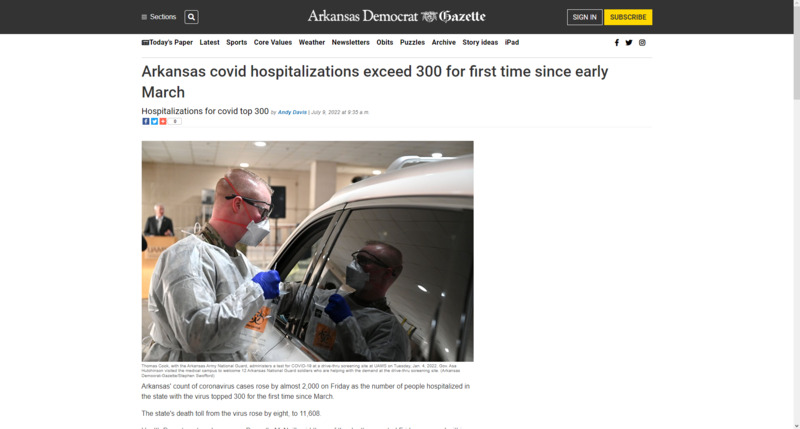 2022-07-09
2022-07-09Hospitalizations on the rise in Arkansas
This is an article detailing a surge in COVID related hospitalizations in Arkansas. The article further mentions an increase in deaths due to COVID-19 and how hospitals are quickly beginning to feel the pressure of overcrowding. The July 4th holiday, doubtless, had an impact. This surge demonstrates not only the minimal precautions taken by individuals as life has seemingly returned to a sense of normalcy, but also demonstrates that many Arkansans are still unvaccinated, and the extreme toll such action is taking on hospitals. -
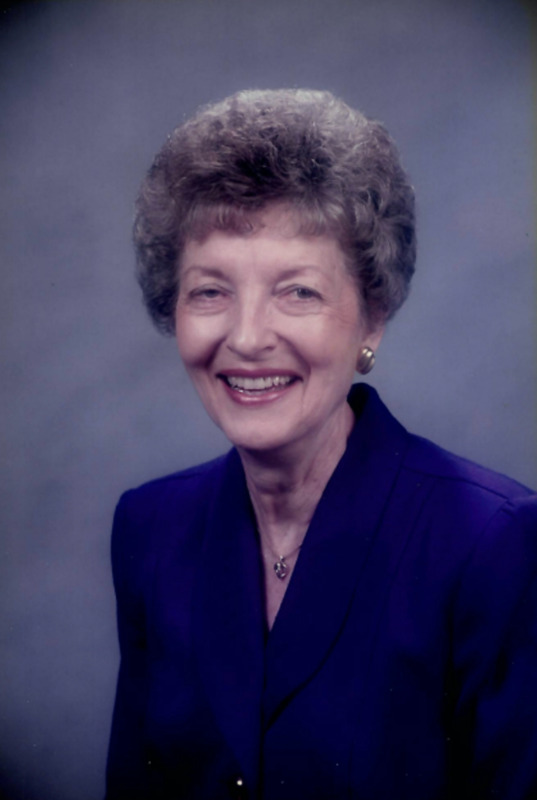 2022-07-02
2022-07-02Taking Care of My Grandma During COVID
This is a story of taking care of my grandma during COVID. A lot of the time I was employed as a caretaker for my grandma overlapped with the height of COVID. -
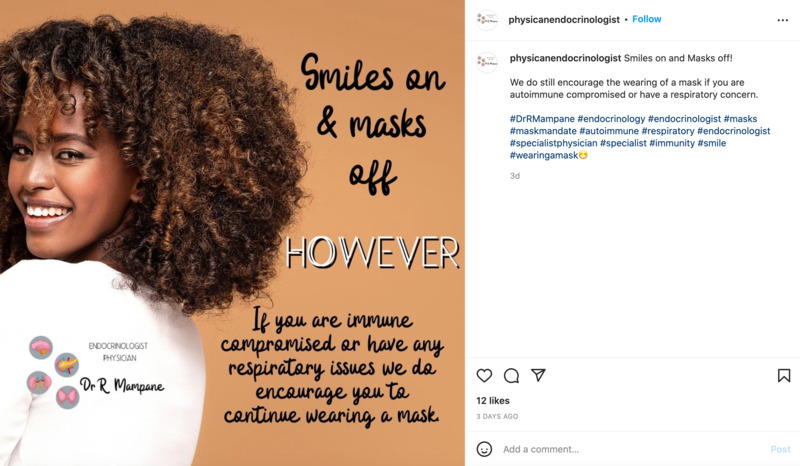 2022-06-23
2022-06-23Smiles on and masks off
This is an Instagram post from physicianendocrinologist. This is about a changing mask policy at the endocrinologist office that posted this. It encourages people that are immunocompromised to wear masks though. -
 2022-05-02
2022-05-02You can't co-opt "my body, my choice"
This is a tweet from Anna Akana regarding the leaked opinion draft from the Supreme Court, which would overturn Roe v. Wade. Here, she is criticizing people who use "my body, my choice" in regards to masks, but don't allow it for when it comes to women's reproductive health. -
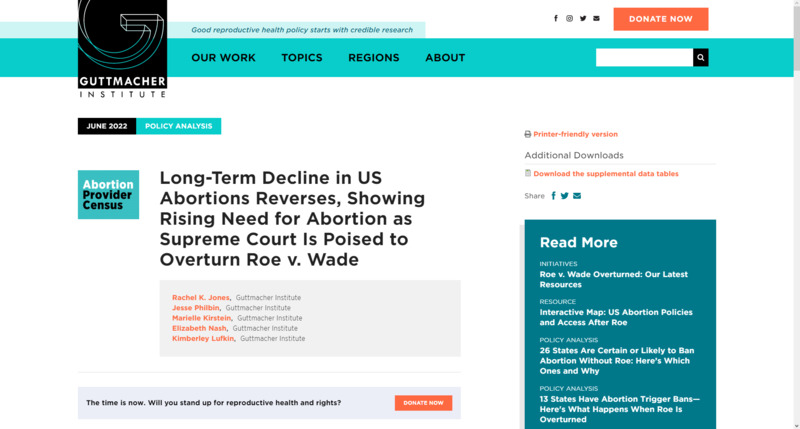 2022-06-15
2022-06-15Long-Term Decline in US Abortions Reverses, Showing Rising Need for Abortion as Supreme Court Is Poised to Overturn Roe v. Wade
This is a news story from The Guttmacher Institute. This article was written before the official Supreme Court decision was released on abortion. The article states that the 30 year decline in abortions has picked up with the threat of Roe v. Wade getting overturned. At the time this article is being entered in, Roe has been officially overturned by the Supreme Court. What is more interesting to me are the numbers given on abortions in 2020, when COVID was at its peak. In 2020, there was 930,160 total abortions, which was an 8% increase from 862,320 abortions in 2017. In 2020, about 1 in 5 pregnancies ended in abortion. The increase in abortions was marked in an overall 6% decrease in births between 2017 and 2020. The article does not discuss the social reasons why more abortions were happening in 2020 compared to other years, but in my own opinion, people's fears of hospitals being too full and the financial strain of lockdowns would have made it difficult to want to carry a baby to term. At the time, people were unsure of how long lockdowns and restrictions would last, so getting the pregnancy care needed to prevent issues giving birth would have been harder to come by. -
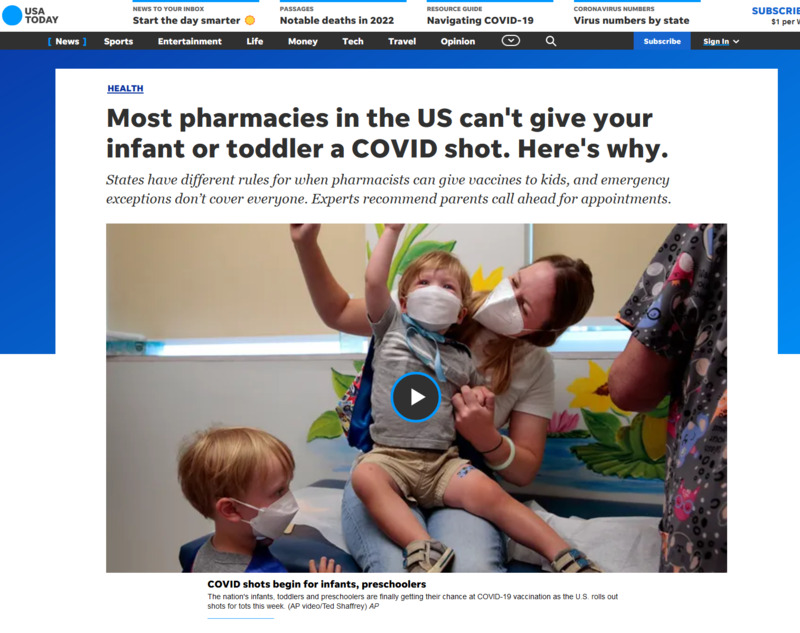 2022-06-23
2022-06-23Most pharmacies in the US can't give your infant or toddler a COVID shot. Here's why
This is a news story from USA Today by Adrianna Rodriguez. Most US pharmacies don't allow their technicians to administer the vaccine to children under five. The age in which the vaccines can be ministered to younger kids varies, with most putting a minimum of five or above. A lot of the reason administering vaccines has been restricted, according to the article, is because not enough pharmacists are trained to give shots to children that young. The overall target is smaller, and the needle even shorter, in addition to needing to calm and anxious child. This makes people hesitant to give young kids the COVID vaccine. It is recommended that if you cannot find a pharmacy that will give the shot to very young kids that you ask your pediatrician for a one-on-one appointment for the vaccine. -
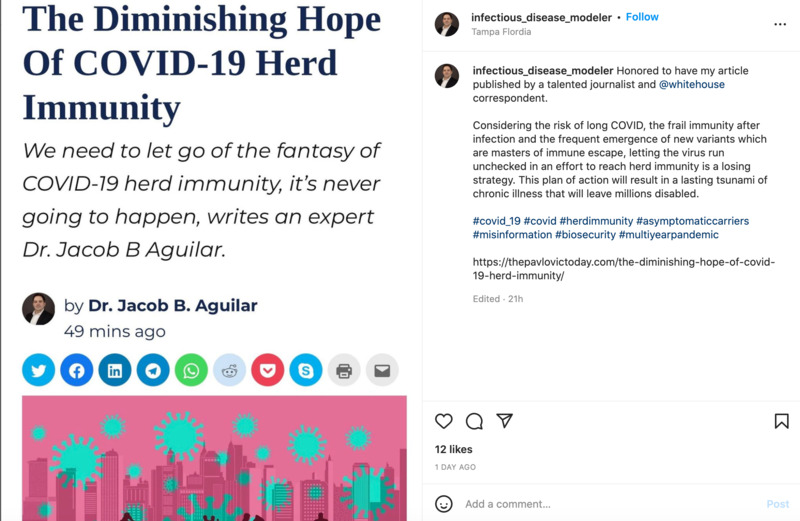 2022-06-16
2022-06-16The Diminishing Hope of COVID-19 Herd Immunity
This is an Instagram post from infectious_disease_modeler (Dr. Jacob B. Aguilar).He wrote an article about how herd immunity doesn't work with COVID as well as it could due to new variants that keep on happening. He says that if vaccines had a 100% effectiveness rates across all situations, this would not really be an issue. Since the vaccines are not entirely effective, the solution, Dr. Aguilar proposes that the way to help mitigate the issue is mass regular testing to slow the spread of new variants. -
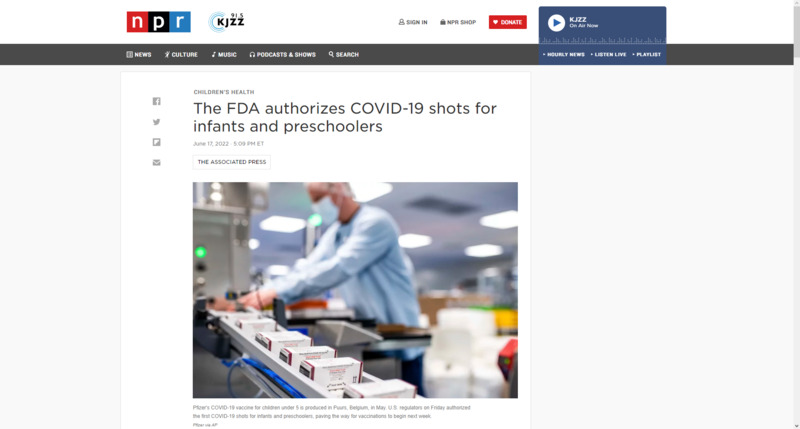 2022-06-17
2022-06-17The FDA authorizes COVID-19 shots for infants and preschoolers
This is a news story from NPR by The Associated Press. The United States has authorized the use of vaccines for infants and preschoolers. The Center for Disease Control and Prevention (CDC) is debating how the vaccines are to be administered. The article says that studies support giving these age groups the vaccines, as they are said to be effective and have minor side-effects. -
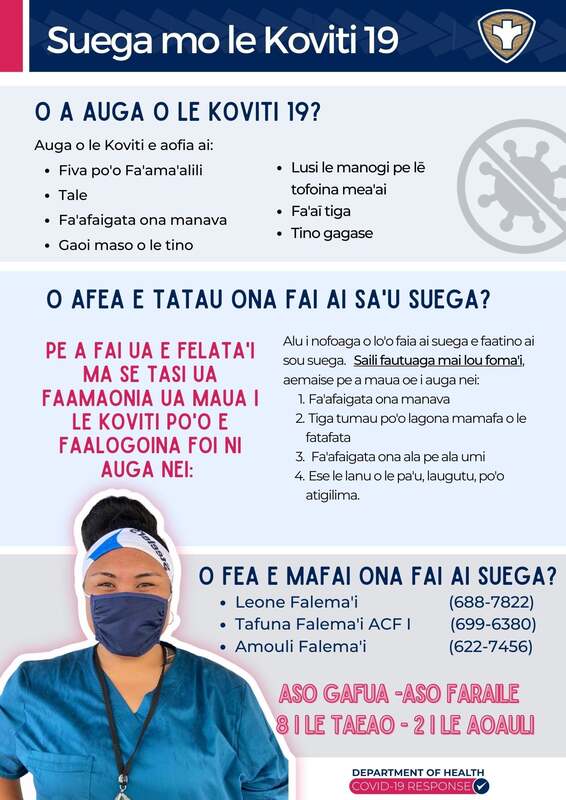 2022-02
2022-02American Samoa COVID-19 Testing Schedule
The American Samoa Department of Health released this flyer in both English and Samoan languages for the public so they would know what time and day COVID testing sites are open, where they are located, and the number to call for each site if they need further information. Not only was this released online but placed in every store of the island. -
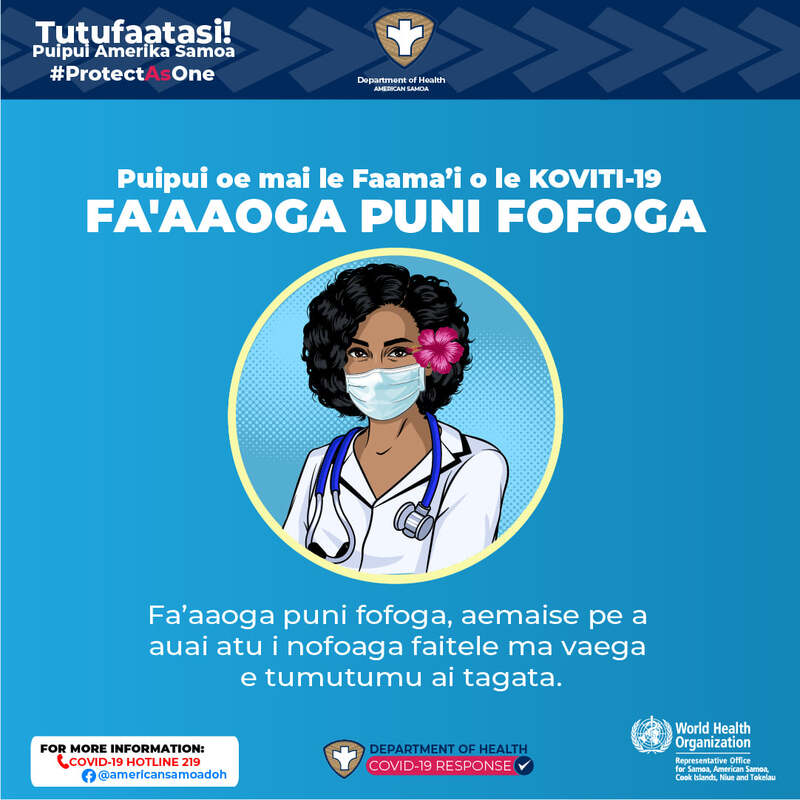 2022-02
2022-02Wear a Mask: Fa'aaoga Puni Fofoga
With the rise of covid cases in American Samoa at the beginning of this year in February, the Department of American Samoa Health Department partnered up with the American Samoa government to make sure that the people of American Samoa are well aware of what to do to combat COVID. It is one of the many flyers and ads released by the ASDOH for the public of American Samoa. They are released in both the English and Samoan languages. This flyer is for people to wear a mask and in the Samoan language, fa'aaoga puni fofoga. -
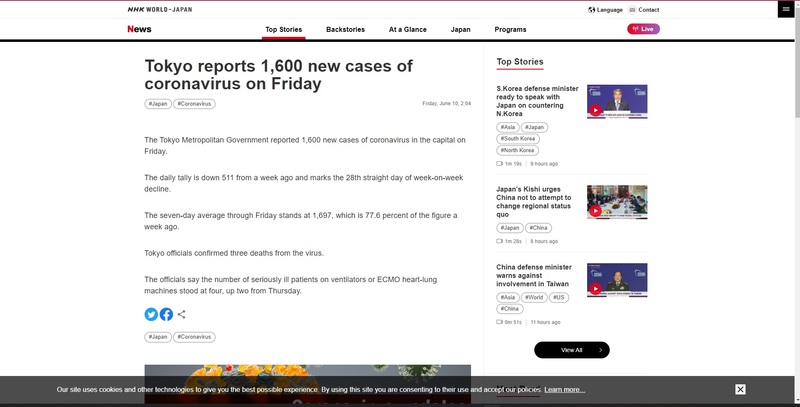 2022-06-10
2022-06-10Tokyo reports 1,600 new cases of coronavirus on Friday
This is an article from NHK World-Japan. There have been more COVID-19 cases reported in Tokyo, Japan. However, the article reports that the cases have been in decline despite these new 1,600 cases. The Japan Times website, they have a timeline that discusses the same 1,600 new cases, but also shows an Outbreak map of Japan's current cases, deaths, testing, and other things. This is a reminder that Japan is still struggling with the virus, but there is some hope with the cases decreasing weekly. -
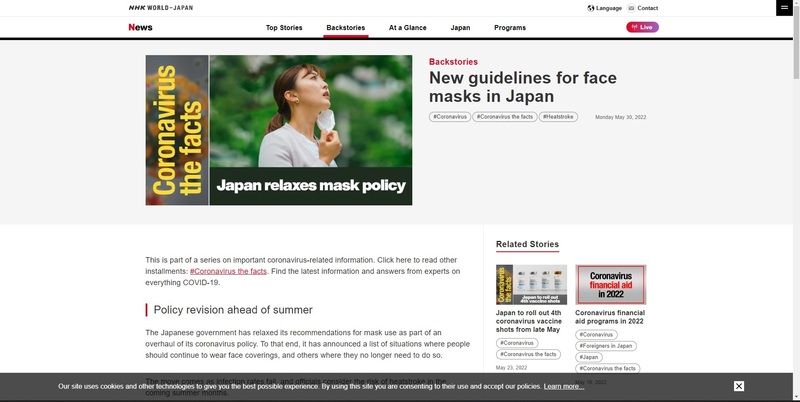 2022-05-30
2022-05-30New guidelines for face masks in Japan
Japan, as of May 30th, 2022, is relaxing the face mask guidelines. For the most part, masks do not need to be worn outdoors except when the elderly are in close quarters to other people. Indoors, masks are still required indoors except in the case of when someone is in little to no conversation, which the article shows in a chart. The chart's example states walking around museums and libraries where there is little to no conversation. One of the reasons for why Japan is relaxing face masks is because summer is approaching and the temperature will rise. There are fears about face masks causing heatstroke. In Japan, temperatures can range from 70-90 degrees F, but the summers are hot and humid too. So, it makes sense to relax the restrictions, especially in the outdoors. -
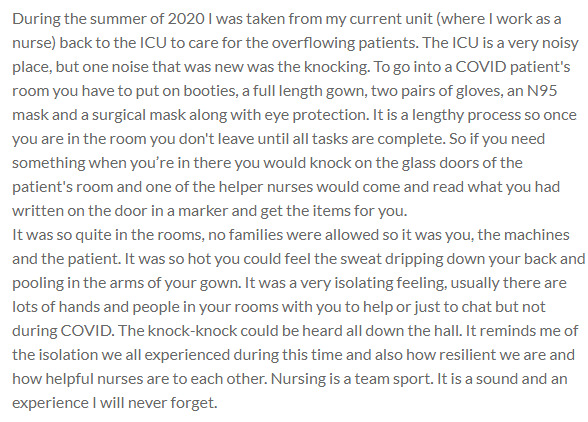 2020-08-06
2020-08-06Knock Knock
During the summer of 2020 I was taken from my current unit (where I work as a nurse) back to the ICU to care for the overflowing patients. The ICU is a very noisy place, but one noise that was new was the knocking. To go into a COVID patient's room you have to put on booties, a full length gown, two pairs of gloves, an N95 mask and a surgical mask along with eye protection. It is a lengthy process so once you are in the room you don't leave until all tasks are complete. So if you need something when you’re in there you would knock on the glass doors of the patient's room and one of the helper nurses would come and read what you had written on the door in a marker and get the items for you. It was so quite in the rooms, no families were allowed so it was you, the machines and the patient. It was so hot you could feel the sweat dripping down your back and pooling in the arms of your gown. It was a very isolating feeling, usually there are lots of hands and people in your rooms with you to help or just to chat but not during COVID. The knock-knock could be heard all down the hall. It reminds me of the isolation we all experienced during this time and also how resilient we are and how helpful nurses are to each other. Nursing is a team sport. It is a sound and an experience I will never forget. -
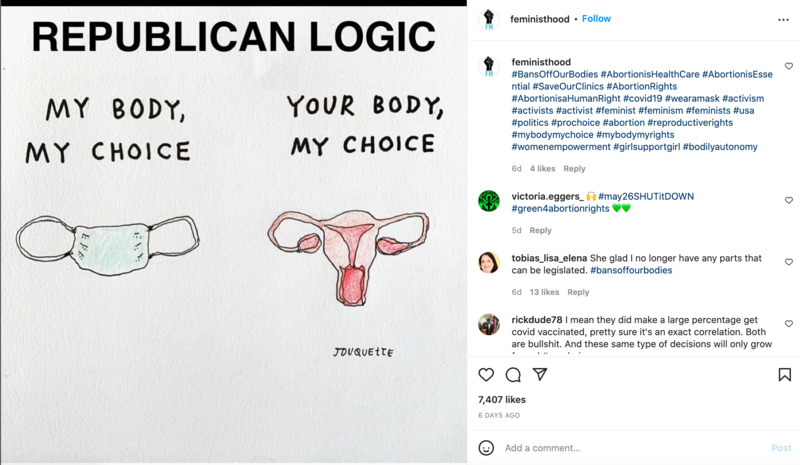 2022-05-22
2022-05-22Republican logic
This is an Instagram post from feministhood. It is making the comparison between the rhetoric Republicans have had regarding COVID versus abortion. The person writing this says thinks that it is rather contradictory. The contradiction comes from thinking that "my body, my choice" applies to masks and vaccines, but should not apply to abortion. The commonality is that both issues deal with bodily autonomy.
